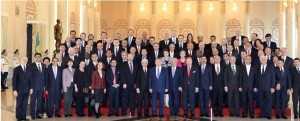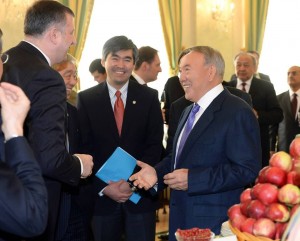 ASTANA – To effectively implement the Kazakhstan 2050 Strategy, the country seeks stronger dialogue and wider mutually beneficial cooperation with all foreign partners, President Nursultan Nazarbayev told foreign ambassadors and head of offices of international organizations during his annual grand meeting with them on Feb. 5.
ASTANA – To effectively implement the Kazakhstan 2050 Strategy, the country seeks stronger dialogue and wider mutually beneficial cooperation with all foreign partners, President Nursultan Nazarbayev told foreign ambassadors and head of offices of international organizations during his annual grand meeting with them on Feb. 5.
Addressing the gathering, which included more than 80 ambassadors, charges d’affaires and heads of representative offices of such organisations as the United Nations and the European Union, the President said Kazakhstan is interested in such cooperation especially in the fields of “investment, technology, innovation and expertise, and in growing the exports of Kazakhstan.”
“I encourage foreign entrepreneurs to actively invest in Kazakhstan, to establish production facilities, and build successful, mutually beneficial businesses, not only in the sector of natural resources and advanced processing, but also in infrastructure, agriculture and many more,” he told the assembled diplomats. “Implementing its industrial policy, Kazakhstan will further create all the conditions so that businesses are able to gain profits for their own and for our country. We hope for understanding and support from your governments and seek a constructive relationship across these areas.”
In his extensive remarks at the Akorda presidential residence, Nazarbayev covered in detail the top priorities of his Jan. 17 state-of-the-nation address and the newly approved Concept of Foreign Policy for 2014-2020. The President was keen to stress the mutual benefits of the country’s pursuing its development priorities and achieving its goal of becoming one of the world’s top 30 most developed economies by 2050 for both Kazakhstan and its foreign partners.
Mutually Beneficial Economic Cooperation Is the Word
Listing areas such as extracting and deep processing of raw materials inside the country, manufacturing, electronics, chemical, agriculture and food processing, automobile and aircraft industries, among others, as promising for cooperation, Nazarbayev reconfirmed the country’s commitment to ensuring some of the best environment both foreign businesses.
“We will create most favourable conditions to attract foreign investment, which will help bring in new technologies and innovations,” he said. “I encourage business captains of your countries and leading multinational companies to build factories and develop the service sector in our country.”
According to the head of state, Kazakhstan today possesses the most powerful economic potential in Central Asia, and its economy is more than two times larger than the economies of its neighbours put together.
If recent economic performance is any indicator of future progress, Kazakhstan has a lot going for it. The figures for 2013 showed Kazakhstan’s GDP growing six per cent, while unemployment was around five per cent. The gross international reserves of the country reached around $100 billion.
“Kazakhstan has set and implements clear modernization tasks,” Nazarbayev said. “These relate, primarily, to the accelerated industrialization of the economy. In the course of implementing the development programme, 780 new enterprises were commissioned and 160,000 new jobs were created over four years. In total, the programmeenvisages the creation of 950 enterprises with 250,000 new jobs and the total value of $70 billion. The plan is being effectively implemented; it is supported by necessary financing and resources. As an outcome, Kazakhstan will produce more than 250 new types of products.”
Already today, Kazakhstan-made products are exported to 111 countries.
Caution Regarding Regional Economies, Afghanistan, Support for Syria Talks, Iran Settlement
Turning to foreign policy priorities and international relations in general, the President noted “some positive shifts in the global economic situation” and said these made him come up with two important considerations.
The first one relates to the cyclical nature of the global economy, of which everybody should be mindful, and the second has to do with the notion that “in times of growth, the importance of security issues increases.”
“Unresolved social problems in countries of both the Old and New Worlds still threaten to escalate into internal conflicts,” he said. “See for yourself. Whatever the experts are saying about what is currently happening in Ukraine, the roots of the deteriorating situation lie in social issues. We are also facing some bleak predictions for individual regional economies.”
“Afghanistan remains the critical issue in Central Asia’s regional security, but a political solution is not beyond reach,” he continued. “This year will be very important for Afghanistan: the next presidential election will be held, and international forces will be withdrawn.”
“International forces have played an historic role in the stabilization, not only of Afghanistan but also throughout Central Asia.For this, we greatly appreciate the contribution of the United States, Germany, United Kingdom and many other countries,” Nazarbayev stressed.
“I suppose, a period of economic renaissance has begun for Afghanistan,” he continued. “I think we all are interested in a peaceful, stable and developing Afghanistan, and we are ready to continue our work with the global community to stabilize the situation in the country. Kazakhstan will actively participate in the process. This will help maintain stability in the region.”
Kazakhstan welcomes the start of the Geneva talks on a political settlement for Syria and hopes for their success. In its turn, Kazakhstan hosted two rounds of multilateral negotiations in Almaty on the settlement of the situation regarding Iran’s nuclear programme.
“We have been proud to contribute to the ‘Geneva breakthrough’ in this way, and give it our full welcome and support,” the Kazakh President said. “My participation in the inauguration of the new President of Iran and negotiations held in Iran were aimed at [promoting the] peaceful resolution of the existing problem. Kazakhstan voluntarily abandoned nuclear weapons, was recognised by theworld community for this and became a good ‘beacon’ for countries such as Iran.”
“Pragmatism, consistency and balance,” and reasons for Eurasian integration
Speaking about Kazakhstan’s foreign policy generally, the head of state said that Astana remains faithful to its underlying foreign policy principles of “pragmatism, consistency and balance.”
In recent years, Kazakhstan has increased its cooperation with other countries and in multilateral format. In 2013 alone, leaders of Russia, China, the European Commission, the UK, Indonesia, Spain, Belarus, Kyrgyzstan, Turkmenistan, Finland and Latvia visited Astana.
Kazakhstan will continue to develop ties with its traditional partners, such as Russia, China, neighbours in Central Asia, the United States and the European Union. Yet, it would also work to expand cooperation with countries in the Western Hemisphere, Southeast Asia and Africa. Already, last year new Kazakhstan embassies were established in Vietnam and South Africa and this year the embassies will be opened in Ethiopia, Mexico and Kuwait.
According to one participant of the event who had a chance to attend such meetings several years ago, one thing he noticed right away was the larger number of people in the room, evidence of both growing ties between Kazakhstan and other countries and growing interest among foreign countries in Kazakhstan.
Kazakhstan has also intensified its participation in multilateral efforts to strengthen global peace and security. Following parliamentary approval last year, 20 Kazakh military observers will be dispatched to UN peacekeeping missions in Haiti, Western Sahara, Côte d’Ivoire and Liberia.
Kazakhstan also officially launched its campaign for election to a non-permanent seat on the UN Security Council for 2017-2018.
March 2014 will mark 20 years since Nursultan Nazarbayev, in his famous speech at the Moscow State University, proposed the creation of a Eurasian Union.
“This year, symbolically, Kazakhstan, Russia and Belarus are expected to sign an agreement on the Eurasian Economic Union,” Nazarbayev told the diplomats, adding that several other states have also declared interest in joining this process.
“The Eurasian Economic Union is a common market. It will be a fundamentally new relationship for the 21st century, working on the principles of equality, mutual benefits and the interests of all participants,” he explained. “It is estimated that through the Customs Union, Kazakhstan, Russia and Belarus will achieve additional GDP growth of 25 percent, or more than $600 billion, by 2030.Participants of the Eurasian Economic Union will not be shut off from the world and will continue to actively cooperate with all partners.We support the proposal of the President of Russia, regarding the formation of a future free trade area between the Eurasian Economic Union and the European Union.”
The Kazakh leader sought to allay concerns about integration processes in Eurasia and explained his views on these trends.
“We hear various expert opinions on the Eurasian economic union,” he said. “I think it is necessary to make it clear that this is not a political organization. Currently it is about economic cooperation, which is determined by the needs of our countries. I believe, it is necessary to shift from criticism and distrust to examining in details and understanding the essence of the union, as well as to seeking the ways of cooperation.”


